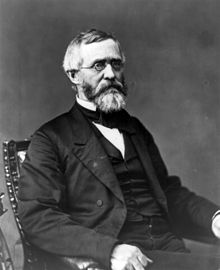Ebenezer Rockwood Hoar
| Ebenezer Hoar | |
|---|---|
 |
|
| Member of the U.S. House of Representatives from Massachusetts's 7th district |
|
|
In office March 4, 1873 – March 4, 1875 |
|
| Preceded by | Constantine Esty |
| Succeeded by | John Tarbox |
| 30th United States Attorney General | |
|
In office March 5, 1869 – November 22, 1870 |
|
| President | Ulysses Grant |
| Preceded by | William Evarts |
| Succeeded by | Amos Akerman |
| Personal details | |
| Born |
Ebenezer Rockwood Hoar February 21, 1816 Concord, Massachusetts, U.S. |
| Died | January 31, 1895 (aged 78) Concord, Massachusetts, U.S. |
| Political party |
Whig (Before 1854) Republican (1854–1895) |
| Spouse(s) | Caroline Brooks |
| Education | Harvard University (BA, LLB) |
Ebenezer Rockwood Hoar (February 21, 1816 – January 31, 1895) was an American politician, lawyer, and justice from Massachusetts. He was appointed U.S. Attorney General in 1869 by President Ulysses S. Grant; he became the first U.S. Attorney General to head the newly created Department of Justice in July 1870. As Attorney General Hoar worked with President Ulysses S. Grant and Secretary of State Hamilton Fish over contentious issues as settling the Alabama Claims with England and in keeping the United States from recognizing Cuban belligerency during the Ten Years' War. Hoar assisted Grant in appointing two Supreme Court justices that helped overturn a decision outlawing paper money as legal tender. Hoar himself, nominated by President Grant, was rejected by the Senate to fill a Supreme Court vacancy, in part due to senators' dismay over Hoar's resistance to distribution of federal patronage jobs without regard to the job applicant's capabilities.
Hoar's position on Grant's Cabinet was tenuous, since two Cabinet members, Secretary of the Treasury, George S. Boutwell and Hoar, were from Massachusetts, during an era when regionally balanced cabinets were an expected norm by members of the U.S. Senate. In June 1870, Hoar was asked to resign by President Grant; Hoar's unexpected resignation became controversial when his resignation letter to Grant was printed by news journals. Hoar departed from office in November 1870, upon the confirmation of Amos T. Akerman from Georgia.
Hoar came from a prominent Puritan family that had settled in Massachusetts in 1640. An exceptionally bright student from his youth, Hoar attended Harvard College starting in 1831 and graduated in 1835. After teaching and traveling in the West, Hoar returned to Concord and studied law, passing the bar in 1839. In 1846, Hoar was elected as a Whig to the Massachusetts State Senate. From 1849 to 1855, Hoar served on the Massachusetts court of common pleas. In 1859, Hoar was appointed to the Massachusetts Supreme Judicial Court, serving until his appointment as U.S. Attorney General in 1869. After serving as U.S. Attorney General, Hoar served on a joint high commission between the U.S. and the United Kingdom, which negotiated the Treaty of Washington (1871), which created an arbitration tribunal to settle the Alabama Claims against the United Kingdom, and created an arbitration process to settle other trade, territorial and maritime issues with the Dominion of Canada.
...
Wikipedia
